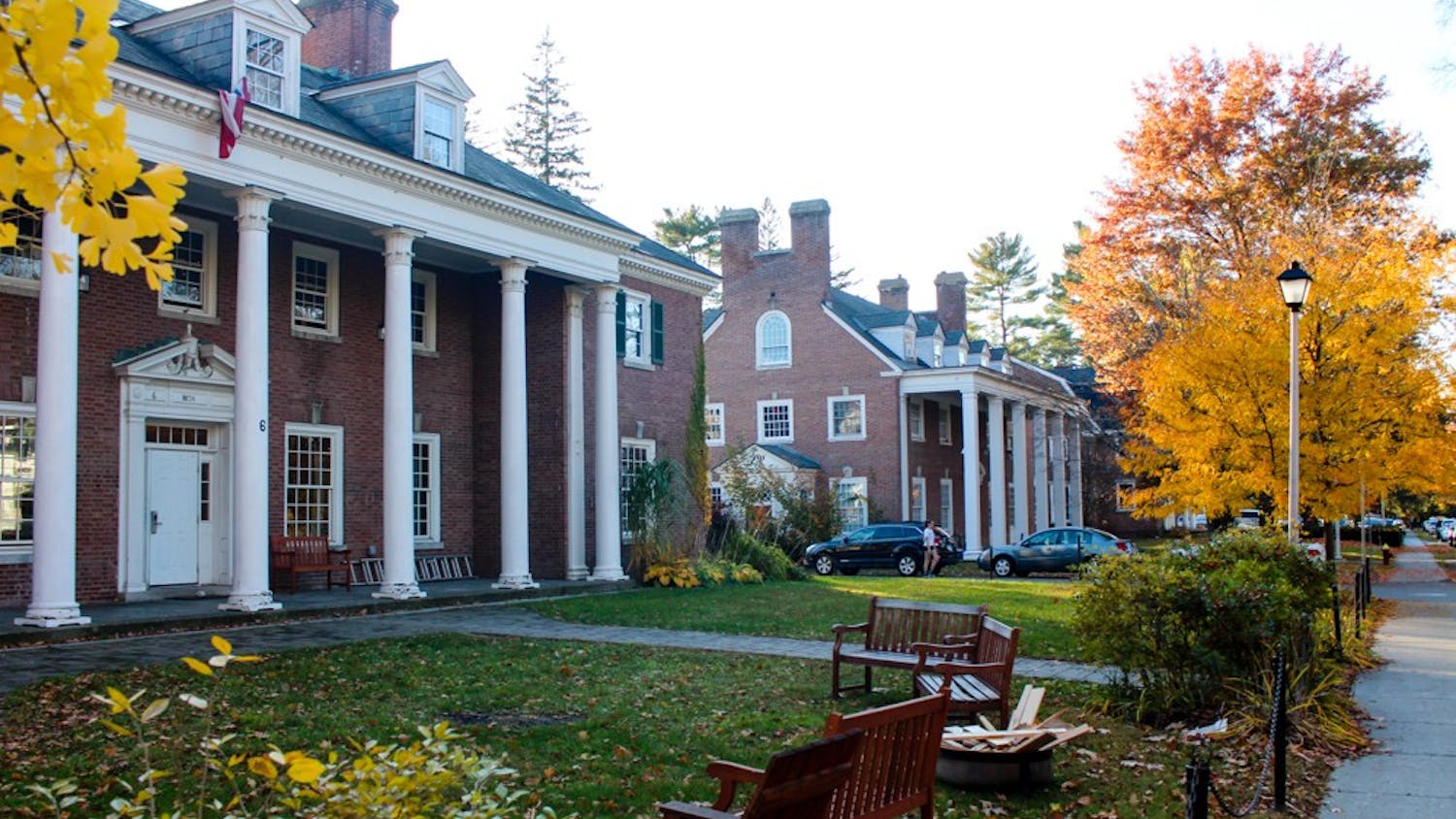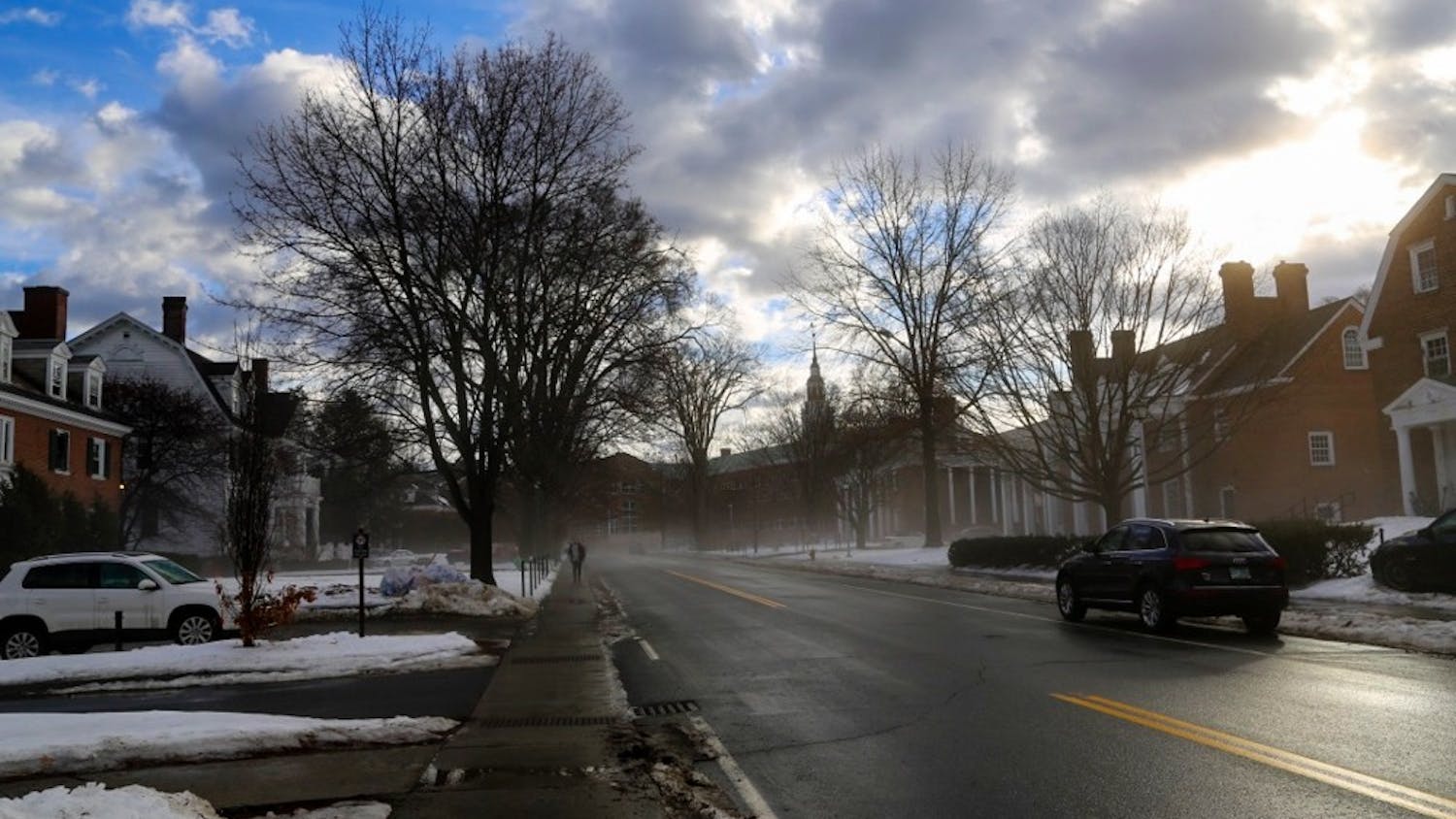With the close of the College’s first-ever virtual rush, which saw the participation of over 700 students, many Greek houses have welcomed their smallest rush classes in years.
This year, fraternities extended 316 bids, and sororities offered 284 — a drop from the 336 total bids offered by fraternities and 349 bids offered by sororities across last fall and winter.
“Interest in rush in general this year was a lot lower,” Alpha Chi Alpha fraternity rush chair Jonah Kahl ’22 said. “It wasn’t the same experience. A lot of guys are taking gap years. … There are other things going on that they’d rather be worrying about than rushing.”
About 90% of those who registered for fraternity rush and about 70% of those who registered for sorority rush accepted bids at the end of the rush process.
27 bids have been extended at Alpha Chi, 31 at Beta Alpha Omega fraternity, 26 at Bones Gate fraternity, 29 at Chi Gamma Epsilon fraternity, 26 at Chi Heorot fraternity, 33 at Gamma Delta Chi fraternity, six at Kappa Kappa Kappa fraternity, 27 at Phi Delta Alpha fraternity, 30 at Psi Upsilon fraternity, 34 at Sigma Nu fraternity, 30 at Theta Delta Chi fraternity and 17 at Zeta Psi fraternity.
Interfraternity council president Michael Saturno ’21 added that BG, Tri-Kap, Phi Delt, Sig Nu and Zete chose to participate in a second optional night of shakeout.
Seven fraternities out of 11 — Alpha Chi, Bones Gate, Chi Gam, Heorot, Tri-Kap, Psi U and Zete — saw declines in their rush class size compared to last year. Tri-Kap, which extended 24 bids last year, saw the largest decrease, followed by Zete, which extended 27 last year.
These figures do not include students who rushed Scarlett Hall — the house formerly known as Sigma Alpha Epsilon fraternity, which was derecognized by the College and its national organization. Scarlett Hall did not participate in the IFC rush process but did rush new members. Representatives of Scarlett Hall could not be reached for comment.
Meanwhile, as of Feb. 1, 39 bids have been extended at Alpha Phi sorority, 36 at Alpha Xi Delta sorority, 39 at Chi Delta sorority, five at Epsilon Kappa Theta sorority, which took additional members during the fall term, 36 at Kappa Delta sorority, 43 at Kappa Delta Epsilon sorority, 43 at Kappa Kappa Gamma sorority and 43 at Sigma Delta sorority, Office of Greek Life program coordinator Jessica Barloga wrote to The Dartmouth.
Four houses have also accepted members through continuous open bidding — Chi Delt, EKT, KD and Sigma Delt. Chi Delt took two additional members through COB, while Sigma Delt took one. EKT and KD are still participating in COB, according to Barloga.
All eight sororities saw smaller rush classes than last year’s combined fall and winter rush classes. AXiD and Kappa extended 15 and 14 fewer bids, respectively — the largest drops of any houses.
Of the 387 students who registered for sorority rush, 73% received a bid, according to Office of Greek Life director Brian Joyce. The remainder either dropped during the rush process or did not receive a bid. The percentage of those who received a bid is higher than previous years’ fall rushes — 64% in 2019 and 62% in 2018 — but lower than most winter rushes — 82% in 2020 and 81% in 2019. 89.2% of fraternity members who registered for rush this year received a bid.
Fraternity rush typically involves potential new members attending “pre-rush” events spread throughout previous terms, followed by “shakeout” events, where members receive a bid after houses vote on whom they would like to admit. Phi Delt rush chair Max Schindel ’22 said that virtual rush felt “much less organic” because of the technical limitations of Zoom, which inhibit side conversations and other interpersonal aspects of traditional rush.
“I think a huge component of rush … was getting to know brothers really organically and getting to meet them in a variety of circumstances,” Schindel said.
Kahl said that some Alpha Chi members in the Upper Valley were able to schedule one-on-one coffee chats and meals with potential new members, but most of their events remained online — taking the form of virtual game nights and small group calls — to mitigate COVID-19 risk.
Andrew Bricklin ’23, who accepted a bid at Chi Gam, said that he enjoyed the virtual events but noted that they were “not amazing,” and he found the most meaning in one-on-one coffee meet-ups with members.
“I don’t think anything virtual compares to being in person,” Bricklin said, adding that it is unlikely he will be able to get to know as many seniors in Chi Gam before they graduate, given the later rush cycle and his lack of access to the house.
For sorority rush, APhi president Bruna Decerega ’21 and rush chair Nicole Aboodi ’21 wrote in an email that the fully virtual and therefore more structured nature of this year’s rush process “actually allowed for the conversations to be less surface level” because conversations were longer.
“It was a little crazy, but I think overall they did a really nice job of doing it on Zoom,” Jenna Myers ’23, who accepted a bid at Sigma Delt, said of the overall process.
Myers added that she had a “really positive rush experience,” but she did have to request extensions from professors on several assignments due to the time commitment.
“I had five parties on one day in round one and then a midterm the next day, so that was a really tough turnaround,” she said. “[Rush] can definitely be very time consuming, especially if you’re taking some difficult classes.”
EKT recruitment chair Laurel Semprebon ’22 said that the Inter-Sorority Council tailored the size of parties to each house’s membership, so smaller houses like EKT had a greater number of smaller events. This left the members tired, she said, but less “overwhelmed” by the number of potential new members in each of the initial rounds.
Some houses made changes to their rush processes in response to concerns raised last summer during the 20X Challenge, which sought to shed light on issues of equity, diversity and inclusion in Greek spaces. Decerega and Aboodi wrote that the ISC designed a “bias training program” with input from sororities that focused on educating members on “topics of racial/cultural and socioeconomic exclusivity.”
Additionally, much of the fraternity rush process normally relies on potential new members deciding to attend events and reach out to houses, but this year, houses made greater efforts to reach out directly to potential new members, Schindel and Kahl said. They speculated that this effort, spurred by COVID-19, may have lowered barriers to entry to rush in a way that would also help address issues of exclusivity.
For Myers, Sigma Delt “stood out” as “encouraging those conversations” about diversity and inclusion throughout rush.
She said that she questioned her desire to join the Greek system, a system she said was “built for white people.”
“I think it’s really important to be critical of the systems that you’re in … [and] not to lose sight of the fact that Greek life can have potentially unintended consequences,” Myers said. “… It shouldn’t just be all about throwing parties and who can drink the most Keystone, but instead should be a place where we support women regardless of racial background, gender ... or sexual orientation or any of that.”
The sorority’s matching algorithm used to pair students and houses has also caused potential new members and sorority members some confusion, according to Semprebon. The program, used by sororities nationwide, is designed to take into account sororities’ and potential new members’ preferences when deciding which students will be called back to which houses during each of the three rounds.
“I don’t think it’s well understood,” Semprebon said, adding that the computer program was explained to recruitment chairs but that additional transparency may be helpful for future potential new members. Semprebon said that points of confusion included whether or not houses rank potential new members or simply submit lists of people they would like to call back, as well as whether or not “single-preffing” — a potential new member only marking one house as acceptable on the final night of rush — is penalized in the algorithm.
House leaders said new member education at all houses will, like rush, take place largely virtually. Kahl said that Alpha Chi has focused on online game nights, for example, and Semprebon said EKT will organize virtual big and little meetups.
Additionally, some in-person opportunities may be available. Decerega and Aboodi wrote that meals, walks and “sister dates” are possibilities, and Semprebon said she hopes each local new member will get the chance to visit EKT at least once by the spring.
ISC president Mahalia Dalmage ’21 declined to comment.
Decerega and Aboodi are members of The Dartmouth staff.
Correction appended (Feb. 2, 2021): A previous version of this incorrectly stated that APhi and other sororities designed the bias training program. The article has been updated to reflect that the ISC led the process, though Dartmouth’s sororities were also involved.





